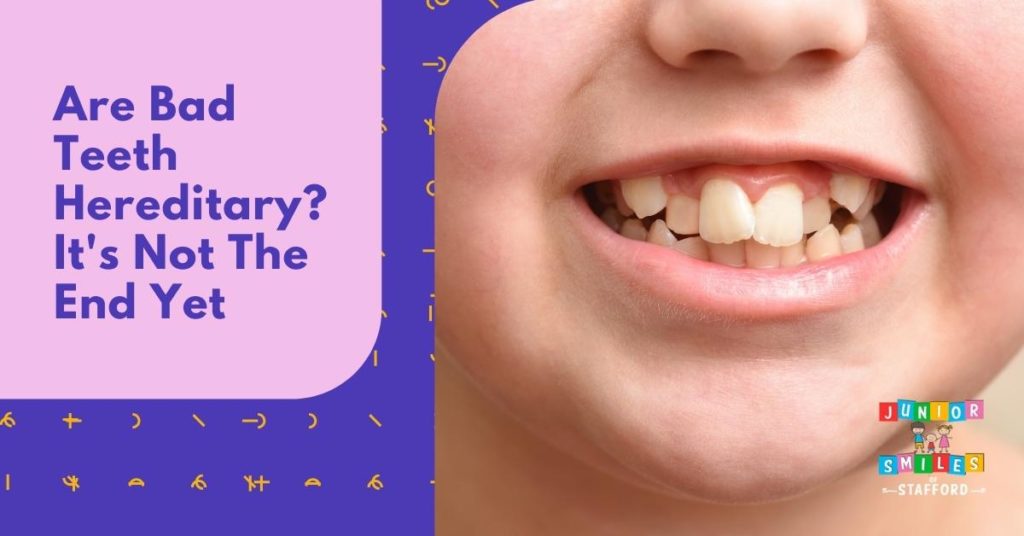Are Bad Teeth Hereditary? It’s Not The End Yet

There is a lot of tooth decay, crooked teeth, overcrowded teeth, and changes in tooth color. All of these oral health issues are things that some people attribute to their parents because they believe in genetic factors. Certain people may be more prone to cavities than others, indicating a higher risk for cavities. Furthermore, your genes may be to blame if you’ve ever wondered why it seems like you have a cavity forming every time you go to the dentist, pointing towards a history of tooth decay.
Can You Be Born With Bad Teeth?
Many individuals often wonder if they’re destined for dental issues from birth, particularly those with so-called bad teeth. The truth is, while certain dental traits can be inherited, no one is “born” with bad teeth. It’s essential to understand that most dental conditions, like tooth sensitivity, emerge from a combination of genetic predispositions and environmental factors. For instance, while the genetic structure might influence the development of teeth, these traits alone do not determine your overall tooth health.
What is the Role of Genetics in Dental Health?
Genetics can indeed play a significant role in various aspects of your dental health. Studies have shown that genetic factors can influence the likelihood of developing issues such as misalignments, tooth decay, gum disease, and even the strength of your tooth enamel. Certain genetic mutations may predispose individuals to conditions like enamel hypoplasia, where the enamel forms incompletely, leading to thinner enamel, or dentinogenesis imperfecta, which affects the dentin formation. These conditions underscore the necessity for awareness and proactive dental care, especially if there’s a known family history of tooth decay.
Environmental Factors That Impact Dental Health
Understanding the environmental factors that impact dental health is crucial as these are elements within our control, unlike our genetic makeup. They play a pivotal role in either maintaining a mouth healthy or contributing to oral health issues. Here’s a deeper look at these factors:
Diet and Nutrition
Diets high in sugary foods create an environment for bacteria to thrive and produce acids, leading to tooth decay and gum disease. Frequent consumption of acidic items can wear down tooth enamel, leading to sensitivity and cavities. A diet rich in vitamins, minerals, and fresh produce supports healthy teeth and gums by boosting the body’s natural immune response and providing the nutrients needed for optimal oral health, impacting the diet during tooth development.
Oral Hygiene Habits
Neglecting oral hygiene allows plaque to form, which can lead to decay and gum disease. Proper techniques in brushing and flossing are critical for removing food particles and preventing plaque buildup. Therapeutic mouthwashes can help reduce plaque, prevent or reduce gingivitis, reduce the speed of tartar development, or a combination of these benefits, enhancing oral care routines.
Professional Dental Care
Regular visits to the dentist for professional cleanings remove built-up plaque or tartar that brushing at home can’t. These visits also allow dentists to identify early signs of decay, gum disease, or other oral issues. Services like fluoride treatments or dental sealants offer additional protection against decay and cavities.
How Genetics Affect Your Oral Health
The complex interplay between our genes and overall health has been the subject of extensive research, and oral health is no exception. While oral hygiene and environmental factors undeniably play a critical role, genetics can predispose individuals to specific dental concerns. Here’s a deeper dive into the nuanced relationship between genetics and oral health.
Inherited Traits and Dental Structure
Genetics can determine certain aspects of our dental anatomy. For example, some individuals might inherit larger or smaller teeth, affecting spacing and alignment. Such inheritances can lead to overcrowded or crooked teeth. A mismatch between jaw size and tooth size can result in overcrowded or misaligned teeth. This is one of the reasons some people may need orthodontic interventions. Genetics can also influence the formation of the palate, which, if not formed correctly, can lead to issues like an open bite.
Susceptibility to Dental Diseases
Certain genetic mutations can increase an individual’s vulnerability to specific dental conditions. For example, some people naturally produce saliva with a composition that’s more effective at combating harmful bacteria, reducing the risk of tooth decay. Genetic markers have been identified that can increase the chance of gum disease. Individuals with these markers might be more prone to gum inflammation and degradation.
Enamel Strength and Composition
Tooth enamel, the hardest substance in the human body, varies in strength and composition among individuals. Some people naturally have thicker enamel, offering more protection against bacteria and decay. Variations in the mineral composition of enamel can also affect its resistance to acidic attacks, influencing susceptibility to cavities.
How You Can Overcome Genetics
While you cannot change your inherited genes, you can maintain a healthy smile through proper oral health habits. Here are numerous ways to keep your mouth healthy:
Proper dental hygiene
Dentists can’t stress this enough: excellent dental care protects you from any dental disease. Brushing and flossing your teeth at least three times a day plays a good role in your oral health. Consider using a fluoride mouthwash as part of your dental hygiene routine, especially if you have difficulty producing enough saliva.
Avoid unhealthy diet
You might not know this, but the food and drinks you consume are also risk factors for cavities and other dental health issues. Sugary foods and drinks encourage bad bacteria in your mouth and contribute to the sticky plaque. If this is not avoided, you can acquire more oral issues. It would be best to have a healthy diet and consume more fruits and leafy veggies. Drinking plenty of water instead of sugary drinks would also work!
Regularly visit your dentist
It would help if you visited the dentist more often. Consider having a professional cleaning more often than once every six months.
Consult with Junior Smiles of Stafford to Achieve a Brighter Smile
Understanding the role of genetics in dental health is crucial, but it’s not the only factor. While certain genetic predispositions can increase the risk of dental issues, environmental factors such as diet, nutrition, and oral hygiene habits play a significant role in maintaining oral health. Regular dental check-ups are essential for early detection and management of any dental problems.
At Junior Smiles of Stafford, we recognize the importance of comprehensive dental care that addresses both genetic and environmental aspects of oral health. Our team is dedicated to providing personalized care to help you overcome any genetic predispositions and maintain a healthy, radiant smile. We offer a range of services, including regular cleanings, fluoride treatments, and orthodontic interventions, tailored to your unique dental needs.
Don’t let genetics define your oral health. Take control of your dental care today. Contact us for expert guidance and treatment. Book your appointment now and take the first step towards a healthier, happier smile. Remember, a beautiful smile starts with you!

